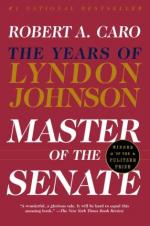|
This section contains 1,116 words (approx. 3 pages at 400 words per page) |

|
Part 3 Chapter 15 Summary
Unlike the House of Representatives, where the constitutionally prescribed leader, the speaker, by precedent wields great power, the Senate is presided over by a figurehead: the vice president, who votes only to break ties. In his absence, frequent during the mid-twentieth century, a president pro tempore was to take the chair. Clearly, the Founding Fathers did not want anyone to control the upper chamber; every senator spoke for himself and on behalf of his sovereign state.
The "Senate Supreme" in the nineteenth century grew increasingly divorced from the meaningful issues of the day, becoming a bulwark against the popular will and sunk in public esteem for doing nothing. It asserted itself, however, in foreign affairs; it is noteworthy that most nineteenth-century secretaries of state had served in the Senate. The American Century required faster reaction than the Senate could muster and...
(read more from the Part 3 Chapter 15 Summary)
|
This section contains 1,116 words (approx. 3 pages at 400 words per page) |

|




